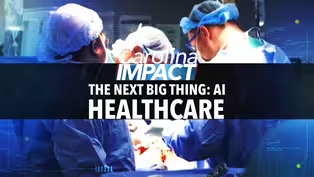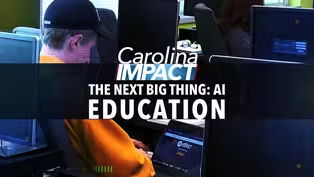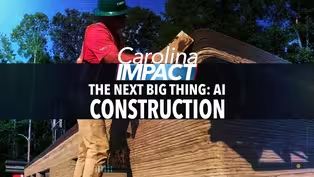
UNCC Students Using Artificial Intelligence In Our Community
Clip: Season 10 Episode 27 | 5m 21sVideo has Closed Captions
AI can be used to improve the lives of people in Charlotte, but what are the consequences?
AI has tremendous potential, as it is increasingly becoming part of our lives. The language and image recognition capabilities of AI systems have developed rapidly, but it has also raised privacy concerns. At UNCC, students are developing programs designed to assist people in their everyday lives. As Beatrice Thompson shows us-- the advent of AI means the world is undergoing changes.
Problems playing video? | Closed Captioning Feedback
Problems playing video? | Closed Captioning Feedback
Carolina Impact is a local public television program presented by PBS Charlotte

UNCC Students Using Artificial Intelligence In Our Community
Clip: Season 10 Episode 27 | 5m 21sVideo has Closed Captions
AI has tremendous potential, as it is increasingly becoming part of our lives. The language and image recognition capabilities of AI systems have developed rapidly, but it has also raised privacy concerns. At UNCC, students are developing programs designed to assist people in their everyday lives. As Beatrice Thompson shows us-- the advent of AI means the world is undergoing changes.
Problems playing video? | Closed Captioning Feedback
How to Watch Carolina Impact
Carolina Impact is available to stream on pbs.org and the free PBS App, available on iPhone, Apple TV, Android TV, Android smartphones, Amazon Fire TV, Amazon Fire Tablet, Roku, Samsung Smart TV, and Vizio.

Introducing PBS Charlotte Passport
Now you can stream more of your favorite PBS shows including Masterpiece, NOVA, Nature, Great British Baking Show and many more — online and in the PBS Video app.Providing Support for PBS.org
Learn Moreabout PBS online sponsorship- AI is gonna be something that we are gonna have everywhere.
- It can help citizen to live easier in cities.
- In the relatively near future based on how fast everything is growing, it's unavoidable that AI's gonna affect our society in a big way.
- [Bea] Artificial intelligence or AI for short, it's been talked about.
- Artificial intelligence.
- And artificial intelligence.
- Artificial intelligence.
- [Bea] And now it's practical applications are showing up in all areas of life, and in ways you may not have considered.
Like the need to get from point A to point B, when you depend on public transportation.
- First times do make a difference.
Sometimes they're late, you know, which makes you late, for other, you know, your appointments.
- Travel time.
I think the travel times will be better with your understand that they need more drivers.
- That's the benefit of AI in general-- - [Bea] And in these classrooms at the University of North Carolina at Charlotte, they've received grants to study artificial intelligence.
These graduate students are working on answers to problems like these, by simply using AI to design programs to make systems like public transportation more efficient.
For the professor who started the program at the university, it's breaking new ground on how artificial intelligence can be used in everyday life situations.
- That's why we as a research university, we are working with public policy makers, stakeholders, local communities to co-create and co-design the technology, and give it to them so they can use it for their own benefit.
- There is a gap between research and actually using it in real world.
And what we are doing here is that we are trying to fill that gap.
- [Bea] In the case of public transportation, during their project research, the student teams talked to writers.
Their point?
Determine where they should start the building of an AI solution for transit issues.
- It was helpful for us to know from different aspects and different locations around the city that what are the problems and how we can, you know, implement the AI to reduce those waiting times and improve the reliability and future.
- We want to use a real time information, like weather condition, like the traffic condition, and also the demand of passengers to make actually this goal achievable.
- [Bea] And while getting people and buses to where they need to be is one way AI can make life easier, the University of North Carolina at Charlotte students are also looking into other applications of artificial intelligence that concerns safety.
Ranging from getting to a car safely in a dark parking lot, to the various ways it could assist law enforcement.
- The AI learns what normal behaviors in an environment look like, and when an abnormal behavior happens, it can tell you not only there's an abnormal behavior here, but how abnormal it is.
- As a woman, I feel like, okay, maybe I cannot feel safe in any environment, but having this in mind that there is a surveillance system that can detect anything, kind of makes me feel more relieved, because I know that there's something watching.
(ominous music) - [Bea] But is this the Orwellian future?
What about profiling?
(sirens wailing) How will law enforcement utilize the information?
Does artificial intelligence take profiling to a new level?
Concerns these developers are well aware of.
- Can this algorithm track me?
Can it be biased against me?
And part of that is the way we have to specify one, these algorithms to be explainable and interpretable, so that we know what decisions it's making based off of what it sees.
And we know whether it's actually keeping track of your information.
- If we don't design AI in a responsible, ethical manner, that's always a concern and we should be aware of it.
- It's not just regulating the AI, but also we can use AI to help us regulate better and more dynamic, based on the needs and based on the requirements and also based on the values of the society.
- [Justin] Well, I divided by it and basically.
- [Bea] So what comes next?
For a PhD candidate, Justin Sanchez, who already works remotely on AI projects for major automaker, it's going to be up to the public to ask key questions about this technology.
- Basically being surrounded by all these AI products, you have to look and see are they actually, do they have a privacy policy?
What technologies they're actually using?
Is that data going to be saved?
And actually to push for regulations for that sort of stuff.
- [Bea] The time of artificial intelligence in many forms has arrived, yet the unanswered question for many may well be, is this the genie that should be let out of the bottle?
For "Carolina Impact," I'm Bea Thompson.
Carolina Impact: May 30th, 2023 Preview
Preview: S10 Ep27 | 30s | Printing 3D Habitat Homes, Medical AI, using AI in our communities, & Chat GPT. (30s)
How Artificial Intelligence Is Helping In The Medical Field
Video has Closed Captions
Clip: S10 Ep27 | 5m 46s | Atrium Health in Charlotte is developing AI technology to improve hernia surgery outcomes. (5m 46s)
How ChatGPT Is Changing The Face of Academics
Video has Closed Captions
Clip: S10 Ep27 | 6m 45s | ChatGPT can answer questions & write papers, all with a few simple commands. (6m 45s)
Printing 3D Homes With Artificial Intelligence
Video has Closed Captions
Clip: S10 Ep27 | 6m 29s | How 3-D printers using AI create affordable housing - faster, cheaper, and maybe better. (6m 29s)
Providing Support for PBS.org
Learn Moreabout PBS online sponsorship
- News and Public Affairs

Top journalists deliver compelling original analysis of the hour's headlines.

- News and Public Affairs

FRONTLINE is investigative journalism that questions, explains and changes our world.












Support for PBS provided by:
Carolina Impact is a local public television program presented by PBS Charlotte



